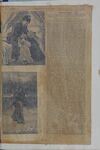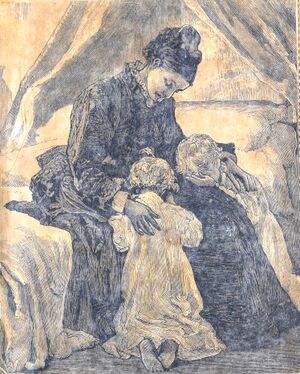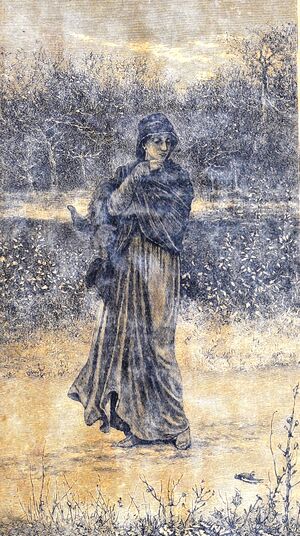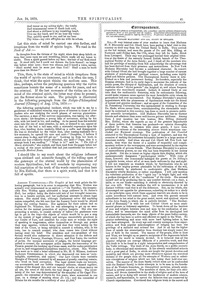Difference between revisions of "HPB-SB-8-129"
m |
m |
||
| Line 42: | Line 42: | ||
| item = 3 | | item = 3 | ||
| type = article | | type = article | ||
| − | | status = | + | | status = proofread |
| continues = 130 | | continues = 130 | ||
| author = Massey, C. C. | | author = Massey, C. C. | ||
| Line 48: | Line 48: | ||
| subtitle = | | subtitle = | ||
| untitled = | | untitled = | ||
| − | | source title = Spiritualist | + | | source title = London Spiritualist |
| − | | source details = | + | | source details = No. 335, January 24, 1879, pp. 41-2 |
| publication date = 1879-01-24 | | publication date = 1879-01-24 | ||
| original date = 1879-01-19 | | original date = 1879-01-19 | ||
| Line 56: | Line 56: | ||
}} | }} | ||
| − | ... | + | {{Style S-Small capitals| Sir}},—It may interest some of your readers to learn that Madame H. P. Blavatsky and Col. Olcott have been paying a brief visit to this country on their way from the United States to India. They arrived on the 3rd instant, and were the guests of Dr. and Mrs. Billing, at Norwood, until Friday last, the 17th, when they left for India, direct from Liverpool. Their stay was prolonged beyond their original intention at the desire of the recently formed British branch of the Theosophical Society of the Arya Samaj; and I think all the members who had the privilege of meeting them will acknowledge the advantage that has been derived from their presence and instructions. In New York Madame Blavatsky had become a celebrated character. In concert with Colonel Olcott she had brought together a large number of earnest students of psychology and spiritual science, including some highly gifted and famous persons. The Theosophical Society there is established on a firm and permanent footing. Its founders, especially the Russian stranger, had in its early days to encounter the ridicule of the public press, the obloquy of Spiritualists, and the slanders of certain mediums whose “divine powers” she laughed at, and whose frequent rogueries she mercilessly exposed. Indeed, it seemed likely at one time that the mediumistic fraternity, with its enthusiastic following, would make common cause against the most formidable critic whom its pretensions had ever encountered. But Madame Blavatsky’s practical acquaintance with the phenomena of Spiritualism made her the friend of honest and genuine mediums; and as agent of the Committee of the St. Petersburg University, she was instrumental in sending to Europe Dr. Slade, whose career there, notwithstanding the abominable treatment he sustained in this country, has done so much to promote public and scientific investigation. And Madame Blavatsky has no warmer friends and admirers than some well-known private mediums. Among them I may mention her late hostess, Mrs. Billing (formerly Mrs. Hollis), whom she regards as one of the greatest depositaries of these powers that America has produced—an opinion thoroughly justified by what, in common with other guests, I have been privileged to witness at the interesting ''seances ''which sometimes concluded our Norwood evenings. The publication of ''Isis Unveiled ''attracted to the Theosophical Society a host of inquirers, and was the occasion of making the authoress favourably known to a large section of American society. And when she and Col. Olcott left New York last month, they were the theme of a number of respectful and complimentary notices in the newspapers, and were accompanied by the regrets of a multitude of private friends. That Madame Blavatsky is a person of extraordinary powers, no one who has been frequently in her society can doubt. But she is intent on higher objects than display, which she contemptuously designates “psychological tricks.” With some of these, however, she occasionally indulged the guests at Dr. Billing’s hospitable house, where all of us were made welcome by day and night. I will not expatiate on wonders which, by Spiritualists who do not believe in the mighty powers attainable by the cultivation of the will, would certainly be attributed to mediumistic gifts that Madame Blavatsky utterly disclaims, or rather repudiates. I will only mention the voluntary production of the “spirit rap” in bright light, and with a profane disregard of all the “conditions” of the circle. She amused herself and us by producing this in any number desired—on a chair, a table, or on our heads—ascribing it entirely to electricity directed by her own will. With the medium the will is unconscious; it is not distinct volition—and that is all the difference. But, on the whole, she discouraged our appetite for phenomena, exhorting us rather to a study of the principles upon which these apparent marvels are shown to be in entire accordance with natural laws. And even this pursuit seemed subordinate in her mind to the great social, moral, and spiritual objects of the Arya Samaj, to which she is entirely devoted. “The Brotherhood of Humanity” is with her and Colonel Olcott no mere sentimental phrase or visionary aspiration. To break down all the barriers of race and religion between man and man by the eradication of prejudice, and to emancipate the mind alike from its theological and materialistic trammels, are the main objects of the great Indian society, of which she has been so active and efficient an agent in the West. No greater undertaking, and none with more hard fighting before it, has ever been attempted. In every age and country exemption from superstition and from popular misconceptions of religion has been the privilege of a cultured and reticent few. And in all but the higher class of minds the emancipation from theology has simply meant the loss of faith in the unseen. The masses of the people, alike in East and West, are brought up as passive recipients of the degenerate beliefs by which the world is bitterly divided. It is believed that all the popular religions are corrupt offshoots of a primitive truth, and that this truth is to be found in a right interpretation and comprehension of the Vedic writings. The work of the Arya Samaj, as a public exoteric body, is educational and missionary. It has already established schools over a great part of India, in which are taught the purest devotion and morality, and which are proving more efficacious against the wretched idolatry of the people than all the attempts of Western zeal to substitute conceptions of religion which are fast losing their hold over ourselves. The answer of the Arya Samaj (which must not be confounded with the Brahmo Samaj) to these attempts is to be seen in the foundation of its Western branches, as theosophical societies, already established in several countries. The members of these, for their own edification, will devote themselves to the study of religion and of the laws of nature, and by so doing will second the tendencies of modern science, research, and speculation, to uproot the fallacies that are conserved by Church organisations. Convinced that religious truth is the surest and {{Style S-HPB SB. Continues on|8-130}} |
| − | {{ | + | {{HPB-SB-footer-footnotes}} |
| − | {{HPB-SB-footer- | + | {{HPB-SB-footer-sources}} |
| + | <gallery widths=300px heights=300px> | ||
| + | london_spiritualist_n.335_1879-01-24.pdf|page=7|London Spiritualist, No. 335, January 24, 1879, pp. 41-2 | ||
| + | </gallery> | ||
Latest revision as of 09:45, 11 July 2024
Madame Blavatsky and Col.Olcott in England
Sir,—It may interest some of your readers to learn that Madame H. P. Blavatsky and Col. Olcott have been paying a brief visit to this country on their way from the United States to India. They arrived on the 3rd instant, and were the guests of Dr. and Mrs. Billing, at Norwood, until Friday last, the 17th, when they left for India, direct from Liverpool. Their stay was prolonged beyond their original intention at the desire of the recently formed British branch of the Theosophical Society of the Arya Samaj; and I think all the members who had the privilege of meeting them will acknowledge the advantage that has been derived from their presence and instructions. In New York Madame Blavatsky had become a celebrated character. In concert with Colonel Olcott she had brought together a large number of earnest students of psychology and spiritual science, including some highly gifted and famous persons. The Theosophical Society there is established on a firm and permanent footing. Its founders, especially the Russian stranger, had in its early days to encounter the ridicule of the public press, the obloquy of Spiritualists, and the slanders of certain mediums whose “divine powers” she laughed at, and whose frequent rogueries she mercilessly exposed. Indeed, it seemed likely at one time that the mediumistic fraternity, with its enthusiastic following, would make common cause against the most formidable critic whom its pretensions had ever encountered. But Madame Blavatsky’s practical acquaintance with the phenomena of Spiritualism made her the friend of honest and genuine mediums; and as agent of the Committee of the St. Petersburg University, she was instrumental in sending to Europe Dr. Slade, whose career there, notwithstanding the abominable treatment he sustained in this country, has done so much to promote public and scientific investigation. And Madame Blavatsky has no warmer friends and admirers than some well-known private mediums. Among them I may mention her late hostess, Mrs. Billing (formerly Mrs. Hollis), whom she regards as one of the greatest depositaries of these powers that America has produced—an opinion thoroughly justified by what, in common with other guests, I have been privileged to witness at the interesting seances which sometimes concluded our Norwood evenings. The publication of Isis Unveiled attracted to the Theosophical Society a host of inquirers, and was the occasion of making the authoress favourably known to a large section of American society. And when she and Col. Olcott left New York last month, they were the theme of a number of respectful and complimentary notices in the newspapers, and were accompanied by the regrets of a multitude of private friends. That Madame Blavatsky is a person of extraordinary powers, no one who has been frequently in her society can doubt. But she is intent on higher objects than display, which she contemptuously designates “psychological tricks.” With some of these, however, she occasionally indulged the guests at Dr. Billing’s hospitable house, where all of us were made welcome by day and night. I will not expatiate on wonders which, by Spiritualists who do not believe in the mighty powers attainable by the cultivation of the will, would certainly be attributed to mediumistic gifts that Madame Blavatsky utterly disclaims, or rather repudiates. I will only mention the voluntary production of the “spirit rap” in bright light, and with a profane disregard of all the “conditions” of the circle. She amused herself and us by producing this in any number desired—on a chair, a table, or on our heads—ascribing it entirely to electricity directed by her own will. With the medium the will is unconscious; it is not distinct volition—and that is all the difference. But, on the whole, she discouraged our appetite for phenomena, exhorting us rather to a study of the principles upon which these apparent marvels are shown to be in entire accordance with natural laws. And even this pursuit seemed subordinate in her mind to the great social, moral, and spiritual objects of the Arya Samaj, to which she is entirely devoted. “The Brotherhood of Humanity” is with her and Colonel Olcott no mere sentimental phrase or visionary aspiration. To break down all the barriers of race and religion between man and man by the eradication of prejudice, and to emancipate the mind alike from its theological and materialistic trammels, are the main objects of the great Indian society, of which she has been so active and efficient an agent in the West. No greater undertaking, and none with more hard fighting before it, has ever been attempted. In every age and country exemption from superstition and from popular misconceptions of religion has been the privilege of a cultured and reticent few. And in all but the higher class of minds the emancipation from theology has simply meant the loss of faith in the unseen. The masses of the people, alike in East and West, are brought up as passive recipients of the degenerate beliefs by which the world is bitterly divided. It is believed that all the popular religions are corrupt offshoots of a primitive truth, and that this truth is to be found in a right interpretation and comprehension of the Vedic writings. The work of the Arya Samaj, as a public exoteric body, is educational and missionary. It has already established schools over a great part of India, in which are taught the purest devotion and morality, and which are proving more efficacious against the wretched idolatry of the people than all the attempts of Western zeal to substitute conceptions of religion which are fast losing their hold over ourselves. The answer of the Arya Samaj (which must not be confounded with the Brahmo Samaj) to these attempts is to be seen in the foundation of its Western branches, as theosophical societies, already established in several countries. The members of these, for their own edification, will devote themselves to the study of religion and of the laws of nature, and by so doing will second the tendencies of modern science, research, and speculation, to uproot the fallacies that are conserved by Church organisations. Convinced that religious truth is the surest and <... continues on page 8-130 >
Editor's notes



